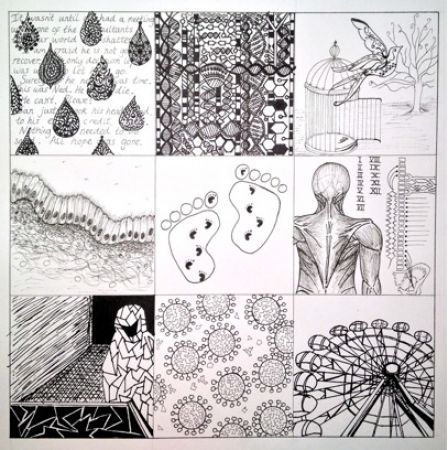A Patchwork of my Experiences
These personal experiences have been large factors in my choice to change career and study Medicine. I still maintain part-time weekend work in Paediatric Intensive Care and sometimes find it a difficult adjustment going straight back into lectures after a long on-call weekend. The memories of my various patients are sometimes very present in my mind, and I have used the patchwork design to illustrate how they sit alongside my current professional learning. I have chosen some of the scientific elements on the medical course – Anatomy, Genetics, Immunology and Histology to highlight the contrast against the more personal experiences.
Critical care is an alien and often very frightening experience for children, and as highlighted in the literature, it is the duty of staff to provide comfort and a safe environment. In my clinical role I get to know my patients personally, and they in turn can develop their trust in me. This relationship provides familiarity and routine for children in my care; but also brings positive affirmation to the job I do. Whilst working with critically unwell children often involves performing uncomfortable procedures, a close relationship often means that I can appreciate the long-term benefit this care provides. A few months ago I received an email containing photos of my patient visiting the London Eye, after they successfully made it home from a difficult and at times very traumatic, lengthy stay. This picture formed the cornerstone of my artistic piece and helped me to reflect upon my experience of caring for this child.
The experiences of parents’ grief, and unit staff sharing in their sorrow, highlights to me that expression of emotion can be one of the most important aspects of care. I have learnt that I do not need to be afraid of expressing emotion if it is appropriate, and that actions to provide comfort can speak louder than words. Development of personal relationships with my patients and their families occur over time, and I otherwise maintain a degree of personal emotional detachment when working in a critical care environment. I do however feel it is important to be able to express empathy, even in scenarios where an emotional relationship has not been formed. A recent shift ended with the loss of a child on the unit. In this instance I assisted by looking after the mother when she became unwell during the resuscitation attempt. I had never met the mother or child before that day, and found myself feeling little personal emotion. Despite this I spent the next twenty minutes holding her hand and giving her what support I could. I worried afterwards that my lack of emotion could be a sign of becoming less human and too detached. However, on reflection, I realise it is the process of desensitising myself in order to cope with such scenarios that allows me to continue, and that this is still a human way to care. I chose to include the story of this mother in my artistic piece, as this reflection was an important personal realisation for me. The anonymous mother has been depicted in my image as made up of broken pieces, stood at the end of an empty bed.
Before working in Paediatric Intensive Care I had never considered attending a patient’s funeral, and was a little surprised to find this a relatively common practice. When I was first invited to attend the funeral of one of my long-stay patients, I initially hesitated, but I am now overwhelmingly glad I attended. During this little girl’s hospital stay there were multiple occasions of disagreement between her parents and the clinical team; and there were times when I had to cause significant distress to their child in attempting to facilitate her recovery. Hearing her parents acknowledge that everyone did the best they could in caring for their child provided me with great comfort, but more importantly, I was able to see how our presence at the funeral gave validation to them in this belief. I imagined this little girl as now flying free, thus depicting her as a little bird uncaged.
In order that emotional expression is harnessed positively it seems imperative that staff have access to appropriate support services. I believe that staff should always have access to debrief sessions to allow for reflective thought, have adjustments of workload in times of severe stress, and have access to counselling. Also, I am firmly of the belief that staff should be supported to attend funerals when it is appropriate, as the benefits of this extend not just to the family and staff, but to the hospital providers through staff representation. Finally, I believe that there should be more formal acknowledgement in clinical guidelines that emotional expression is a human and natural part of caring, and can be a positive and integral part of professional care.

This piece of work gives a realistic view of the different aspects of medicine and the variety in being a doctor. It shows a balance is required between the importance of the duty of care of a doctor and between developing in the scientific field of medicine. It also gives the approach of medicine being both an art and a science. There is a large variety of ways to learn as a doctor, including being emotional learning and learning new and improved treatments and constantly developing as a doctor.